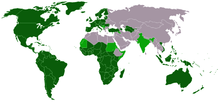Wikijunior:Languages/Latin
< Wikijunior:Languages{{Template:Wikijunior:Languages }}
What writing system(s) does this language use?

Latin uses what is today called the Latin Alphabet. This alphabet is thought by many historians to have been a modified version of the ancient Greek alphabet, which in turn is also a variation of ancient Phoenician writing.
The Latin alphabet is the basis for most European languages and for many other languages around the world, which is why it may look familiar to you if you are reading this in English.
One important difference is that lowercase letters were not usually used in writing classical Latin. Another difference is that the Romans did not use our letters J, U, and W. These letters developed later, as variants of I and V. Because of this, Julius Caesar's name would have been written IVLIVS CAESAR.
How many people speak this language?
Latin is considered a dead language.
The meaning of "dead language" is unclear in this case, but it is commonly taken to mean that there is no one left speaking it as their mother tongue.
Although it is technically possible for people who have learned Latin to speak it, it is considered an unusual thing to do, and normally two such people will use Latin to understand each other only if they have no other language in common.
Still, Latin is sometimes needed by linguists and scientists. It is still the official language of one country: the Vatican, though the form of the language spoken there may be different from the ancient form. Some people also use Latin to translate writing on Roman or ancient artifacts. There are also Conventiculums [pl. Conventicula](conventions) where people may have Latin conversations.
Linguists may need to know Latin, as it is one of the roots of nearly all modern European languages. Scientists often use Latin, along with Greek, to name new species or chemicals.
Where is this language spoken?
The official language of Vatican City is Latin, even though the language is considered extinct. Two thousand years ago, Latin was spoken throughout the Roman Empire, which extended at its height from Portugal to Iraq and from Britain to North Africa. During the Middle Ages and the early modern era, Latin was the predominant language of the Roman Catholic Church and of universities in western Europe. It still is the official language of the Roman Catholic Church. Many Latin words and phrases are still used in the fields of law, science, and medicine. For example, et cetera comes from Latin, meaning "and other things".
What is the history of this language?
Latin is a member of the family of Italic languages, and its alphabet, the Latin alphabet, is based on the Old Italic alphabet, which is in turn derived from the Greek alphabet. The English alphabet is based on the Latin alphabet. Latin was first brought to the Italian peninsula in the 9th or 8th century B.C. by migrants from the north, who settled in the Latium region, specifically around the River Tiber, where the Roman civilization first developed. Latin was influenced by the Celtic dialects and the non-Indo-European Etruscan language in northern Italy, and by Greek in southern Italy.
Although surviving Latin literature consists almost entirely of Classical Latin, a language from the 1st century B.C., this language progressed into Vulgar Latin, which significantly differed from Classical Latin in grammar, vocabulary, and eventually pronunciation. Although Latin remained the main written language of the Roman Empire, Greek came to be the language spoken by the well-educated elite, as most of the literature studied by Romans was written in Greek. In the eastern half of the Roman Empire, which became the Byzantine Empire, Greek eventually supplanted Latin as both the written and spoken language. In the western half, Latin was always the major language.
Some famous people who spoke this language
- Julius Caesar — A famous military general who later went on to be the first emperor of Rome. He wrote down accounts of all of his battles in the Gallic Wars.
- Suetonius — A historian who is probably most famous for his biographies The Twelve Caesars, the first twelve rulers of the Roman Empire.
- Virgil — A poet who wrote the Aeneid, a book on the founding of the city of Rome (based partly on legend).
- Cicero — Probably the best Roman orator, well known for his work in politics and law.
- Livy — An author of Ab Urbe Condita, a history of Rome as a city. His writings are very convoluted — most of his sentences and phrases have some sort of subordination to them.
- Catullus — A poet who writes about and to his friends, about his girlfriend, to insult others, or to give condolences.
- J.R.R. Tolkien — A famous author in the 20th century who wrote The Lord of the Rings and the Hobbit (though not in Latin).
What are some basic words in this language that I can learn?
- Salvē/salvete — Hello [if you are saying hello to more than one person you say salvete]
- bonum diem - good day
- bonam vesperum - good evening
- bonam noctem - goodnight
- valē/valete — Goodbye [if you are saying goodbye to more than one person you say valete]
- ut vales ? - how are you ?
- bene valeo - I am fine, well
- optime - very well
- satis bene - quite well
- non ita bene - not very well
- pessime - terrible
- quod nomen tibi est ? what is your name ?
- mihi nomen est - my name is [then enter your name]
- quod est nomen amicae meae? - what is my friend's name?
- nomen meum - my name
- nomen tuum - your name
- nomen eius - his/her name
- nomina eorum - their names
- amicus meus est - he is my friend
- amica mea - my (girl)friend
- carpe diem - seize the day
- quis? - who?
- hic puer - this boy
- haec puella - this girl
- et tibi? - and you?
- quis est hic/haec - who is this (boy/girl)?
- quod ... est? - what is ... ?
- quae ... sunt? - what are ...?
- ita est ! - so it is/yes
- non - not
- sed - but
- sunt - (they) are
- unde venis? - where do you come from ?
- ubi habitas? - where do you live?
- habito(in) - I live in
- loquor - I speak
- scio - I know (how to)
- scisne loqui ... ? - can you speak ...?
- paulum - a little
- Veni, vidi, vici — I came, I saw, I conquered
- Per Ardua, ad Astra — Through hardship, to the stars
- Exempli Gratia (In English today we write "e.g.") — For the sake of an example, an example
- Id Est (In English today we write "i.e.") — That is
- Nota Bene (In English today we write "n.b.") — Note well
- Et — And
- Tu — You
- Quid tibi nomen est? — What is your name?
- Mihi nomen est Paulum. — My name is Paul.
- Unde venis? — Where do you come from? (lit. From where do you come?)
- E Britannia venio. — I come from Britain.
- Gratias (tibi) ago. — Thank you (lit. I give thanks (to you))
- Et cetera (In English today we write "etc.") — And other things
- Purgamentum — Rubbish
- Cave Canem — Beware of Dog
- Vox Populi — The voice of the people
What is a simple song/poem/story that I can learn in this language?
The poet Ovid was banished from Rome in 8 AD by Augustus, Julius Caesar's great-nephew. This is the first 2 lines of the poem Tristia (meaning "Sorrows"), which Ovid wrote to express his sadness about his banishment.
In Latin:
Parue — nec inuideo — sine me, liber, ibis in urbem:
ei mihi, quod domino non licet ire tuo!
In English:
You will go, my little book, without me to the city, but I don't envy you.
Go on — go to the city forbidden to me — forbidden to your master.
This song by an unknown poet from the 16th Century was popular with students some time ago when everybody had to learn Latin at school:
In Latin:
Flevit lepus parvulus
clamans altis vocibus:
Quid feci hominibus,
quod me sequuntur canibus?
Neque in horto fui
neque holus comedi.
In English:
Wept the little rabbit,
shouting with high voice:
What did I do to the humans,
that they chase me with dogs?
I was not in the garden,
and I did not eat the vegetables
| Wikijunior: Languages | |||
|
Introduction •
Glossary •
Authors and Contributing •
Print Version
| |||
